Search
Showing 10 of 163 results for 丁树江 投资价值分析 学位论文 电子科技大学 2024 页码
-
New Zealand-German academic exchange programme
Under a bilateral exchange arrangement with Germany, Education New Zealand supports early-career researchers from New Zealand to collaborate on research projects in Germany.
Education New Zealand Manapou ki Ao (ENZ) and the German Academic Exchange Service (DAAD) signed a Programmes for Project-Related Personal Exchange (PPP) arrangement in November 2021. Under the arrangement, Education New Zealand contribute funding to support early-career academics from New Zealand universities and Te Pūkenga – New Zealand Institute of Skills and Technology to travel to Germany.
The PPP programme aims to strengthen academic relations between New Zealand and German institutions and to promote cooperative and complementary research activities. It enables young academics involved in the project to further their careers and expand international research links.
The programme covers all subject areas and is open to students who are close to completing their doctorate and to academics who completed a doctorate within the last five years from the date of application.
Applications for the 2024 round are now closed.
-
Apply – Tono
Application
An application must present a specific academic research project of high quality, on which the New Zealand and German institutions intend to work together in a complementary manner.
The New Zealand and the German partner institution must both submit an application. Applications submitted by only one party will result in exclusion from the selection procedure.
• The Project Coordinator applies on behalf of his or her institution and is responsible for the administration of the funding.
• The Principal Investigator (PI) is responsible for providing the scientific information and can also act as the project coordinator.
• Team members may be Master’s or PhD students, Postdoctoral researchers, experienced researchers or academics at a New Zealand institution.Application Guidelines and Required Documents
The following information must be provided, and documents must be uploaded to the application portal:
• Project application (in the application portal)
• Financing plan (in the application portal)
• Project description (Download here) (up to 10 pages)
• Research profile/CV of the New Zealand Principle Investigator (up to 3 pages)
• Research profile/CV of the German Principle Investigator
• List of project-relevant publications by the New Zealand Principle Investigator in the past 5 years (up to 4 pages)
• List of project-relevant publications by the German Principle Investigator in the past 5 years (up to 4 pages)
• Brief CVs of any other project participants that have already been selected at the time of application (up to 3 pages)
• Confirmation from the project assistant if applicableSubmissions and amendments, including to the financing plan, submitted after the application deadline will not be considered. Incomplete applications will be excluded from the selection process.
Selection
All applications will be evaluated by a selection panel that includes senior academics.
Key selection criteria include:
• Technical and content-related quality of the project in relation to the achievement of the project and programme objectives (weighting: 60%)
• Quality and rigour of the project planning (weighting: 20%)
• Appropriate participation of early career researchers (weighting: 10%)
• Consideration of diversity (weighting: 5%)
• Climate-sensitive project organisation (weighting: 5%)Apply
Applications for the 2024 are now closed.
-
Latest recipient of innovation funding will strengthen indigenous links
Te Whare Wānanga o Awanuiārangi (TWWOA) is the most recent recipient of support from the International Education Product Innovation Fund, administered by Education New Zealand Manapou ki te Ao (ENZ).
TWWOA’s pilot project ‘Iwi taketake: an Indigenous postgraduate curriculum’ will see the co-construction of an international Indigenous curriculum from post-graduate certificates through to doctoral studies.
The new curriculum will be developed and delivered with Indigenous college graduates based at Hawai’i, Washington State, Canada and Australia, and will strengthen relationships with and between Indigenous communities and education providers in the United States. The pilot project will demonstrate how applied Indigenous postgraduate education can deliver value for Indigenous communities who are more used to being the subjects of research, rather than the beneficiaries of it.
The first ‘co-badged’ qualifications, awarded jointly by TWWOA and partners offshore, will be offered to learners from 2024 onwards.
The International Education Product Innovation Fund is a New Zealand Government-funded initiative, managed by ENZ, to reimagine how an education from New Zealand can be delivered and create impact for global learners. Learnings from this stream of work will be shared for wider benefit to the sector in late 2023.
Visit the Product Innovation Fund page to learn more and discover all the pilot projects the Fund is supporting.
-
Japanese teachers experience New Zealand’s regional schools
“Waseda University and its affiliated schools are longstanding and valued partners for us,” says Misa Kitaoka, Director of Education in Japan for Education New Zealand Manapou ki te Ao (ENZ).
“It’s exciting to see the strong regional focus they have chosen for their students’ study in New Zealand in 2023 and hear about the planned growth of the programme.”
Waseda University schools will be sending up to 60 students on a group programme to schools in Manawatū and Hawke’s Bay for two weeks in March 2023. The two regions were selected to receive students after taking part in an Expression of Interest process. Close to 80 students have already applied to take part, and Waseda plans to increase the number of participants to 100 from 2024, and to increase the length of their visit in future years.
ENZ hosted the familiarisation tour (famil) to Manawatū and Hawke’s Bay from 21- 25 November 2022. Four Tokyo schools took part alongside Waseda University: Waseda University Senior High School, Waseda University Honjo Senior High School, Waseda Jitsugyo High School and Waseda Saga Junior and Senior High School. The famil was co-funded by ENZ and Air New Zealand, and Palmerston North City Council and Learning Hawkes Bay played a major role in helping to organise visits to 14 different education providers.
“Through the five-day famil, our regional and institutional partners demonstrated their strengths and uniqueness,” says ENZ’s Director Marketing and Strategies, Patrick Holden, who travelled with the delegation.
“Delegates commented on how welcome they felt and how impressed they were to see indigenous Māori language and customs being incorporated into the school curriculum. The manaakitanga shown by the different institutions was well received, especially the pōwhiri.”
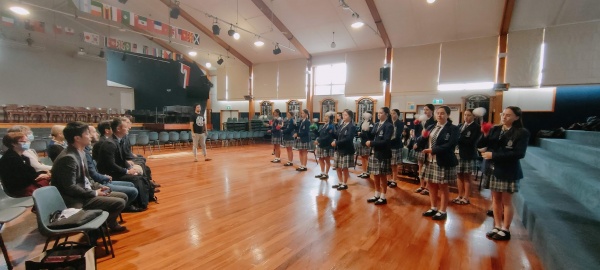
The delegation is welcomed with a powhiri at Napier Girls High School
Misa Kitaoka stressed the importance of destination marketing with support from regional partners.
“While decision-making tends to be institution-led in the tertiary sector, decisions for the school sector are often led by the region or city. This famil was a great opportunity for us to showcase the regions first, followed by the education offerings available in the regions.
“Japanese school students, parents and educators are also interested in cultural experiences in New Zealand beyond education, including the opportunities to interact with local students and host families, and to embrace New Zealand’s cultural values of diversity and inclusion.
“While video-calling offers many benefits and has been vital across the pandemic, bringing famils back into the country means our offshore stakeholders can experience first-hand what New Zealand has to offer. Regional involvement will play a key role in building long-term reciprocal relationships for Aotearoa.”
For more on ENZ’s education partnership with Waseda University and its affiliated schools, please click here.
For more on the value of short-term programmes for international students in New Zealand and the potential benefits to New Zealand and the educator sector, check out this recent Spinoff article: How educational exchange fosters more than just learning | The Spinoff
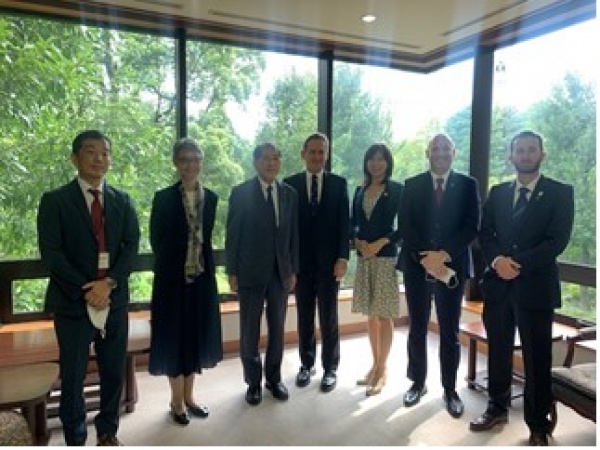
Hamish Cooper, NZ Ambassador to Japan, and ENZ staff Misa Kitaoka, Patrick Holden and Ben Burrowes called on the President of Waseda University, Dr Aiji Tanaka and Prof. Kate Elwood, Dean of Centre for International Education recently to congratulate Dr Tanaka on his reelection as the 18th President of Waseda University
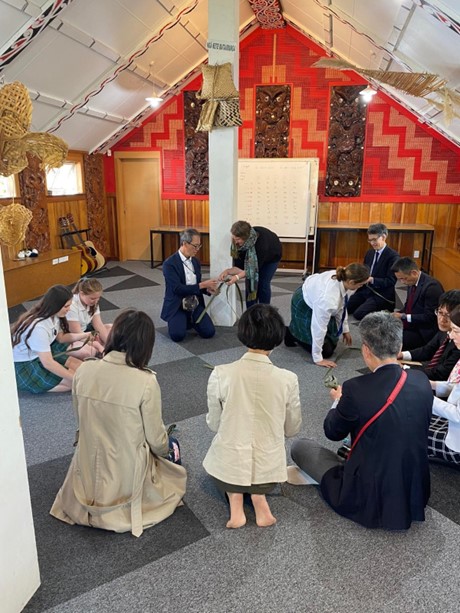
The delegation was welcomed on to the Central Hawkes Bay College Marae where they were given background about the history of the marae and given a quick fire class in flax weaving
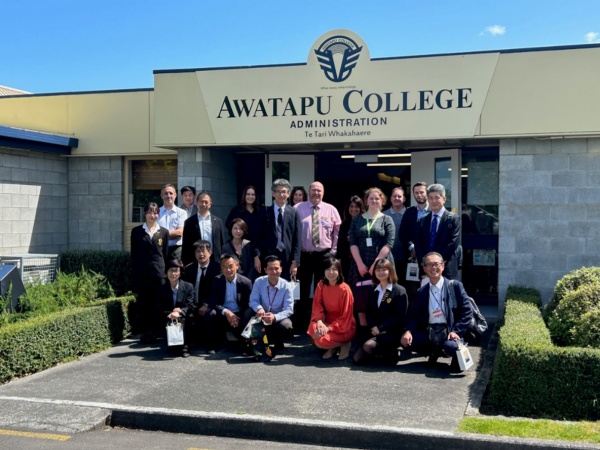
Waseda delegation outside Awatapu College
-
New Zealand-German university projects funded
The arrangement for the exchange of early-career academics (PPP) was signed between ENZ and the German Academic Exchange Service (DAAD) in November 2021, and applications for this round of funding closed in June. It enables young academics involved in the projects to further their careers and expand international research links.
The four successful New Zealand applications came from academics at Massey University, University of Auckland, University of Canterbury, and University of Waikato. The projects, undertaken with German university partners, cover a range of subject areas, from biotechnology and microbiology, to law and sustainable landscape development, to engineering and climatology.
This is the first time ENZ has offered funding under the PPP programme. We plan to launch a second round in April 2023 for projects that will take place from 2024 and 2025.
-
Education New Zealand Manapou ki te Ao welcomes new Board Chair
The Minister of Education, Jan Tinetti, confirmed two new appointments to the Board of Education New Zealand Manapou ki te Ao on 17 March.
Tracey Bridges has been appointed Chair for a three-year term from 1 April 2023. She succeeds Steve Maharey who will finish his term at the end of this month.
Read the Minister’s announcement here.
In addition, two existing Board members have been reappointed. Dr Linda Sissons for a third term until 15 March 2024 and Daniel Wilson to a three-year term.
Tracey Bridges has knowledge of regional economic development, and expertise in strategy, risk, and reputation management, and in social marketing. She is Chair of the Wellington Regional Economic Development Agency Limited (WellingtonNZ), co-founder of The Good Registry and sets on the Boards of Sky Stadium, Whānau Āwhina Plunket, the Wellfed NZ Trust and the Digital Media Trust.
Dr Dona (Therese) Arseneau has been appointed as a member for a three-year term from 1 April 2023. Dr Arseneau also has knowledge of economic development including international education’s contribution to regional economic development, and governance experience in the tertiary sector at the Ara Institute and the Open Polytechnic. She previously chaired Regenerate Christchurch and Enterprise North Canterbury.
-
NZIEC KI TUA 2023 programme announced!
The New Zealand International Education Conference 2023 brings together practitioners and leaders from across New Zealand’s international education sector to look to the future and explore strategies for growth.
Our keynote speakers include:
- Helen Souness: Pathway to the future
- Dr Hinemoa Elder: Māori stories for global learning and teaching
- Dr Stephen Holmes: Post-pandemic insights from international students and parents
- Yemi Penn: Igniting your rebellious curiosity
- Dr Paul Spoonley: International education in 30 years
- Bridget Williams: International education and the sustainable development goals
- Sharon Zollner: The national and global economic outlook for 2024
- Kaila Colbin: Future of education
The conference also includes a range of energising breakout sessions hosted by experts in the sector, centred on the themes of Marketing Smarts, Growing Global, Authentically Aotearoa and Fresh Offerings.
Breakouts include Excellent experiences – Spotlight on student experience insights hosted by Marie Clark and Ross Crosson, ChatGPT, now what? Pitfalls and opportunities of AI in student recruitment hosted by Audrey Voon, Ko wai koe? Building indigeneity into your internationalisation strategy hosted by Monique van Veen and The intersection of EdTech and traditional education hosted by an expert panel.
Check out the full programme here: https://www.nziec.co.nz/agenda
We look forward to seeing you at NZIEC KI TUA 2023, register today: https://www.nziec.co.nz/registration
-
Around the world in five
Asia
India’s path to internationalised higher education
India's higher education system is expanding internationalisation efforts to retain students and enhance global competitiveness. The National Education Policy (NEP) 2020 focuses on cross-cultural understanding and fostering global perspectives. The government encourages collaborations with foreign universities and has established foreign campuses in India to offer world-class education opportunities at home.
North America
US sector applauds gov’t export strategy
The US government's National Export Strategy includes international education for the first time, recognising its importance for the country's global competitiveness. While stakeholders celebrate this move, they urge the government to take further action to protect and strengthen the US's position as the leading destination for international students.
South America
In 2022, Brazilian agencies experienced significant growth in business volumes, with language plus work programmes being highly requested by students. The total number of students placed by surveyed agencies was 7,802, and overall business growth reached 57%. The preferred destinations remained the UK, United States, Canada, South Africa, and Australia, with more students planning to study abroad for higher education.
Europe
Record number of international students for Spain's universities
Spain's international student population surged by 13.6% in the 2021/22 academic year, reaching a record 170,222 students, led by significant growth from Latin American countries like Colombia and Ecuador. The top ten markets all exceeded pre-pandemic levels, with efforts underway to improve work opportunities for non-EU international students.
Africa
Nigerian students rush to secure UK places before dependants ban
International students are applying to UK universities for September 2023 to avoid a forthcoming ban on bringing family members from 2024. Nigerian applications have surged, while some Indian students explore alternative study destinations like such as Canada and Australia.
-
From the CE: 12 months on from the borders reopening
Kia ora tātou,
Twelve months ago, New Zealand’s borders reopened to international students. From a standing start the international education sector has, alongside Education New Zealand Manapou ki te Ao (ENZ) and our New Zealand Inc partners in government, worked enormously hard.
The first challenge was to get New Zealand back “on the map” as a high-quality international education destination. One of our ENZ teams tells me that we were involved in a minimum of 27 events including NAFSA, ANZA, EAIE, agent and student fairs over the last 12 months. There have been at least 11 senior ministerial and sector delegations covering China, India, Viet Nam, Japan, South Korea, US, Canada, Chile, Brazil, and Thailand. This is only the tip of the iceberg of all the effort expended by New Zealand providers, with our partner agents, providers and Government agencies – offshore and onshore.
And as students started to apply for their visas and arrive in New Zealand, we cannot underestimate the amount of effort that has been required to get the infrastructure that supports the sector up and running. Reviewing applications, delivering offers of place, processing visas, finding accommodation, pastoral care; the list goes on. Lots of unseen and unheralded effort that goes on behind the scenes to ensure international students receive a high-quality experience.
Yet this is just one part of what we do. Onshore and offshore, the sector has also supported the Prime Minister’s and Manaaki Scholarships, and worked closely with ENZ to explore opportunities to innovate and make the sector more resilient.
It isn’t easy and while we all know that there is more to do on all fronts, it is worth taking a moment to acknowledge just what has been achieved together.
Turning our attention to the next 12 months, in June the ENZ Board approved our business plan for this financial year (1 July 2023 to 30 June 2024). The plan has four clear priorities:
- Grow inbound student mobility for Aotearoa New Zealand
- Support sector capability development
- Build global connections
- Encourage and support innovation in the sector
Within these priorities, close to 75% of our discretionary budget is focused on the first one. This is completely aligned with Focus Area 1 of the New Zealand International Education Strategy, which is to help providers of international education to build back onshore offerings. We know there is more to do and over the next 12 months the priority is to build on the good start we have made and cement the recovery and rebuilding of the sector.
That’s not to say we aren’t investing in the other areas; we are. We will continue to build global connections. These connections go hand-in-hand with our first priority and in some countries, they are essential to achieving it.
We will also build on the lessons of the past 12 months around innovation. In the first week of August, we organised a series of events facilitated by Professor Martin Bean, a recognised leader in discussions around the future of education. His brief was to provoke and encourage discussion on what the future could look like and what it might take to get there. You can read more about his visit in our E-News story here.
And when it comes to building sector capability this week’s NEW ZEALAND INTERNATIONAL EDUCATION CONFERENCE KI TUA is an immediate opportunity to listen, learn, discuss, contribute, and network with specialists and colleagues. It will be great to be able to meet in person for the first time in close to three years and to celebrate the 30th time that we have joined together as a sector. I look forward to meeting and talking with many of you over the next few days.
Mauri tū, mauri ora, an active soul is a healthy soul.
Ngā mihi
Grant
-
Thank you to NZIEC KI TUA Partners
The conference was attended by 599 delegates and saw 42 sessions delivered over two days by 85 speakers, including expert panellists.
Thanks again to our NZIEC KI TUA 2023 Partners; our Country of Honour: People’s Republic of China, CSCSE, Streamliner, Student Safe, Flywire, idpconnect, IELTS, Southern Cross Travel Insurance, Kiwiflora Nurseries, Yoobee College of Creative Innovation, Orbit Protect, Host Families, Christchurch Foundation and the Tui Corridor Project, University of Canterbury, University of Canterbury International College, Lincoln University and The University of Auckland.
Being the first in-person conference since 2019, connection was more important than ever and our NZIEC KI TUA 2023 exhibition hall was renamed The Experience Garden where delegates could do just that – engage, connect, and experience.
Delegates who visited the team at the Country of Honour’s Chinese Service Center for Scholarly Exchange (CSCSE) table, were able to have their name written in Chinese calligraphy and learn more about studying in China.
Locally made ice cream was provided by Southern Cross Travel Insurance, barista-made coffee from Student Safe and a special tea café was brought to delegates by idpconnect and IELTS.
Delegates also had the opportunity to experience a virtual reality journey with Yoobee College of Creative Innovation.
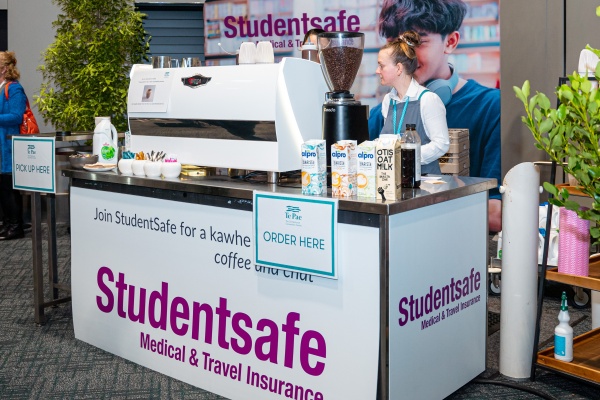
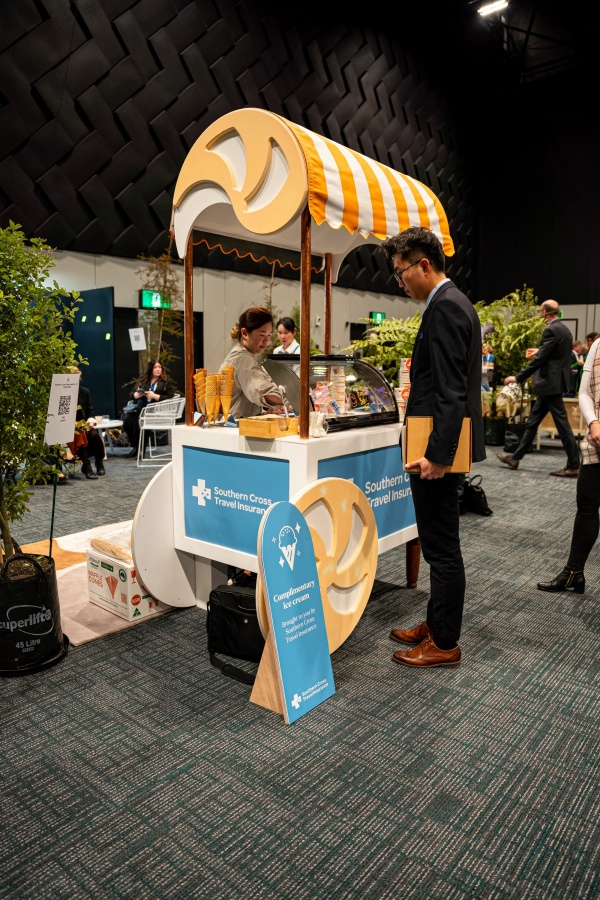
Thanks to the Kiwiflora Nurseries massage relaxation corner, delegates also got a chance to rest with a neck and shoulder massage and relax in their cosy and tranquil waiting area. Kiwiflora Nurseries partnered with NZIEC KI TUA and the Christchurch Foundation and the Tui Corridor Project to help us in our commitment to sustainability; for every delegate registration, a native tree was planted, fostering a greener future for generations to come.
The Host Families photography headshots activation was a hit with over 80 photos taken by the photographer.
The Orbit Protect Better Health Quiz provided delegates with a little downtime and a fun competition as they went head-to-head in earning points for prizes.
And last but not least, much appreciation goes to our partner Flywire as the Education New Zealand Manapou ki ta Ao Tamaki Makaurau Auckland office now has a new piece of artwork based on the theme of ‘How collaboration will shape the future of global education’ for their wall.
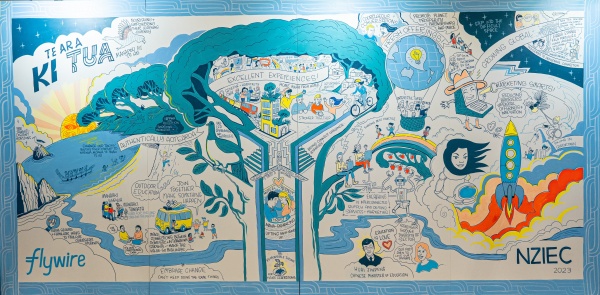
Thanks to all our 2023 partners in making this year’s conference a great one!
Check out the photo highlights reel from NZIEC KI TUA here.
We look forward to having you join us at Tākina in Te Whanganui-a-Tara Wellington on 6-8 August 2024.


